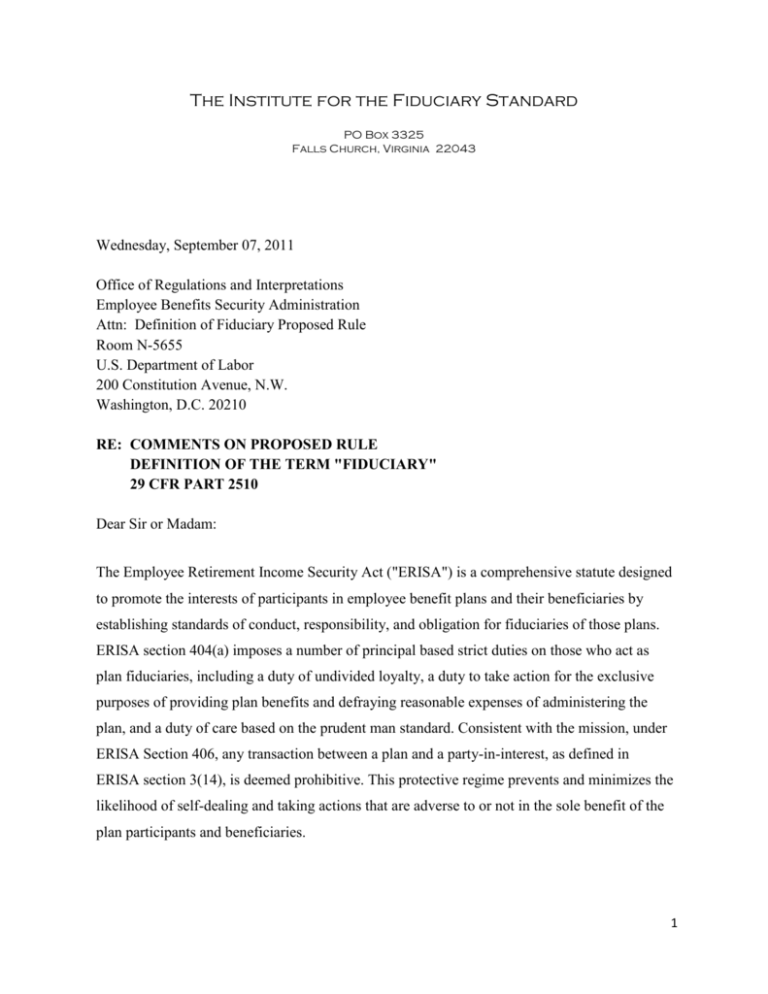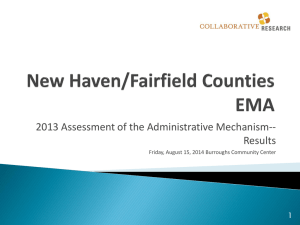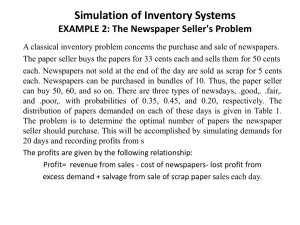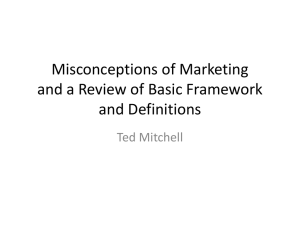Sellers Exemption Letter to DOL - The Institute for the Fiduciary
advertisement

The Institute for the Fiduciary Standard PO Box 3325 Falls Church, Virginia 22043 Wednesday, September 07, 2011 Office of Regulations and Interpretations Employee Benefits Security Administration Attn: Definition of Fiduciary Proposed Rule Room N-5655 U.S. Department of Labor 200 Constitution Avenue, N.W. Washington, D.C. 20210 RE: COMMENTS ON PROPOSED RULE DEFINITION OF THE TERM "FIDUCIARY" 29 CFR PART 2510 Dear Sir or Madam: The Employee Retirement Income Security Act ("ERISA") is a comprehensive statute designed to promote the interests of participants in employee benefit plans and their beneficiaries by establishing standards of conduct, responsibility, and obligation for fiduciaries of those plans. ERISA section 404(a) imposes a number of principal based strict duties on those who act as plan fiduciaries, including a duty of undivided loyalty, a duty to take action for the exclusive purposes of providing plan benefits and defraying reasonable expenses of administering the plan, and a duty of care based on the prudent man standard. Consistent with the mission, under ERISA Section 406, any transaction between a plan and a party-in-interest, as defined in ERISA section 3(14), is deemed prohibitive. This protective regime prevents and minimizes the likelihood of self-dealing and taking actions that are adverse to or not in the sole benefit of the plan participants and beneficiaries. 1 ERISA contains various statutory exemptions from the prohibited transaction rules; these exemptions were enacted by Congress to prevent the disruption of a number of customary business practices involving employee benefit plans. Furthermore, ERISA section 408(a) authorizes the Department of Labor ("Department") to grant administrative exemptions, on either an individual or a class basis, from the restrictions of ERISA sections 406 and 407(a) in instances where such relief meets the following three general principles: (i) administratively feasible, (ii) in the interests of the plan and its participants and beneficiaries, and (iii) protective of the rights of participants and beneficiaries of such plan. It is through the use of Statutory Exemptions or Administrative Exemptions that ERISA permits otherwise prohibitive transactions to be carried out by a party-in-interest for plan operation and meet fiduciary duties under Section 404(a). Under the Department's proposed rule 29 CFR Part 2570 dated August 30, 2010 regarding "Prohibited Transaction Exemption Procedures; Employee Benefit Plans", it states that "the Department requires, as a condition of every exemption, that the terms of the subject transaction be no less favorable to the plan than the terms which the plan could obtain in an arm’s-length transaction with an unrelated party. Depending on the facts and circumstances of a particular transaction, additional conditions for exemptive relief generally are required." On October 22, 2010, the Department of Labor proposed regulation 29 CFR 2510.3-21(c) under ERISA ("Proposed Regulation") that more broadly re-defines the circumstances under which a person is considered a fiduciary by reason of giving investment advice to a benefit plan or a plan’s participants and beneficiaries. The proposed rule intends to better protect participants from conflicts of interest and self-dealing by giving a broader and clearer understanding of when persons providing such advice are subject to ERISA’s fiduciary standards. 2 The current regulation uses a five-part test to determine if a person should be deemed an investment fiduciary under ERISA section 3(21)[A](ii). If the person is able to avoid the application of any one of the five tests, he would effectively disclaim the investment fiduciary status. The proposed regulation removes the most frequently used provisions of "regular basis", "primary basis" and "mutual agreement" for disclaiming the application of fiduciary status and restoring the principal based rule of conduct for the protection of plan participants and beneficiaries. One class exemption under the proposed regulation regarding the redefinition of a "fiduciary" is often referred to as the "Sellers Exemption". The supplemental information portion of the Proposed Regulation, section c - Limitations, describes the "Sellers Exemption" as follows: "Paragraphs (c)(2) of the proposal sets forth certain limitations with respect to the application of paragraph (c)(1). Paragraph (c)(2)(i) provides that a person shall not be considered to be a person described in paragraph (c)(1) with respect to the provision of advice or recommendations if, with respect to a person other than a person described in paragraph (c)(1)(ii)(A), such person can demonstrate that the recipient of the advice knows or, under the circumstances, reasonably should know, that the person is providing the advice or making the recommendation in its capacity as a purchaser or seller of a security or other property, or as an agent of, or appraiser for, such a purchaser or seller, whose interests are adverse to the interests of the plan or its participants or beneficiaries, and that the person is not undertaking to provide impartial investment advice. This provision reflects the Department’s understanding that, in the context of selling investments to a purchaser, a seller’s communications with the purchaser may involve advice or recommendations, within paragraph (c)(1)(i) of the proposal, concerning the investments offered. The Department has determined that such communications ordinarily should not result in fiduciary status under the proposal if the purchaser knows of the person’s status as a seller whose interests are adverse to those of the purchaser, and that the person is not undertaking to provide impartial investment advice. However, the Department believes there is an inherent expectation of impartial investment advice from a person described in paragraph (c)(1)(ii)(A) (involving representations or acknowledgment of ERISA fiduciary status with respect to providing advice or recommendations). Accordingly, paragraph (c)(2)(i) does not apply to such a person." "The Department intends that a person seeking to avoid fiduciary status under the proposal by reason of the application of paragraph (c)(2)(i) must demonstrate compliance with all applicable requirements of the limitation. " 3 A plan sponsor or plan administrator is expected to prudently select and monitor service providers as well as the investment options made available under a retirement plan. To that end it is a good policy to encourage vendor and investment diversity so that plan sponsors will have more, and not less, choices to prudently evaluate, analyze, and compare in meeting their fiduciary responsibility. Retirement assets are expected to continue to grow and dominate investment assets and the Seller Exemption will not stifle product innovation and competition so that better investment products at more competitive prices will become available. Thus, it is reasonable to exempt a class of individuals ("Seller" or "Sellers") who does not represent itself as investment fiduciaries under ERISA section 3(21)[A](ii) and with a sole interest of selling and marketing their investment products and services. However, the Department's attempt to promote the interest of plan participants and beneficiaries through the Sellers Exemption has created significant unintended consequences which may have defeated some of the Department's stated objectives for the Proposed Regulation. The Proposed Regulations states that if the Seller "can demonstrate that the recipient of the advice knows or, under the circumstances, reasonably should know, that the person is providing the advice or making the recommendation in its capacity as a purchaser or seller of a security or other property, or as an agent of, or appraiser for, such a purchaser or seller, whose interests are adverse to the interests of the plan or its participants or beneficiaries, and that the person is not undertaking to provide impartial investment advice." The low burden of meeting this Seller Exemption is 1) the "demonstration" and "under the circumstances" phrase, and 2) the recipient knows or, under the circumstances, reasonably should know ("KORSK Standard") clause. 1) Demonstrate and under the circumstances The Department did not offer any standard, benchmark, guidance or bright line test to a Seller so that the Seller can confidently say, or demonstrate, that the recipient of the advice knows or, under the circumstances, reasonably should know, that the Seller is not a fiduciary and his conduct does not have to rise to the "sole and exclusive" standards required under ERISA. In fact, the demonstration should be so clear that the recipient of the advice knows or, under the circumstances, reasonably should know, that the Seller interests are adverse to, inconsistent with or not in the sole interests of the plan or its 4 participants or beneficiaries, and that the Seller is not required or expected to provide impartial investment advice. The current language under the Proposed Regulation leaves the "demonstration" in the hands of the Sellers and provides Sellers the discretion to interpret their own actions and inactions to suggest if this low standard has been met to relief them from being considered investment fiduciaries under ERISA section 3(21)[A](ii). The "under the circumstances" phrase is also troubling. If the Seller fails to demonstrate that the recipient of advice knows that the Seller is not a fiduciary then the Seller must demonstrate that "under the circumstance" the recipient of advice should know that the Seller is not acting as an investment fiduciary. The Proposed Regulation fails to define the prevailing circumstances necessary for the Sellers to demonstrate that the recipient of advice should have known that the Seller is not an ERISA fiduciary. 2) KORSK Standard The recipient of the advice is also not informed of or given basic guidance under the Proposed Regulation to differentiate between a Seller and an ERISA section 3(21)[A](ii) investment advisor. The KORSK standard is unclear and uncertain. The determination of "knowing" under KORSK rests with the Seller and not the recipient of advice. The recipient of advice is an ERISA fiduciary and carries the burden and duties associated with being a fiduciary. As such, the Proposed Regulation should offer clear and ascertainable standards for the Seller to demonstrate and for the recipient of advice to differentiate and acknowledge a seller of services and investment from an ERISA investment fiduciary. 5 ERISA's promotion and protection of the interests of participants in employee benefit plans and their beneficiaries is based upon holding plan sponsor and plan fiduciaries responsible and liable for their behavior. The set of principal-based fiduciary rules and conduct rests solely on the shoulders of the fiduciaries and not with service providers to the retirement plan. The Proposed Regulation should place the determination responsibility on the fiduciaries and not shared by or shifted to Sellers. Furthermore, the Proposed Regulation should precisely state the actions and process required for a seller to qualify under the Seller Exemption. By convention, applying the Sellers Exemption most likely requires some sort of disclosure. Disclosure is troublesome on its face. Independent academic research suggests, quite simply, disclosure is not effective. By "not effective" I apply a standard suggested by Commissioner Troy Paredes’ when he framed the issue in his 2003 paper, as then professor Paredes, and suggested two things are needed for a regulatory regime based on disclosure. "First, information has to be disclosed. Second and often overlooked, the users of the information - for example, investors, securities analysts, brokers and portfolio managers - need to use the disclosed information effectively." A snapshot of the abundance of independent academic research reviewed in the attached paper, soon to be published, by professor Robert Prentice of the University of Texas. Professor Prentice reviews the research and concludes: “Unfortunately, disclosure mandated by government often does not do the job with which it is charged. There are now many, many studies which tend to indicate that mandated disclosures as a remedy … is often ineffective.” Further, Prentice made special note of disclosure aimed at informing customers of brokers of non-fiduciary status. “NFD (no fiduciary duty) disclosures do not provide customers of brokers sufficient material with which to adequately assess their situation and protect themselves from potential abuse. Nor do NFD disclosures adequately rein in brokers. Rather, they may well cause brokers to unconscientiously give customers more biased advice than they would have given in the absence of disclosures, as they grant themselves moral license to depart from their own ethical standards.” (p.36) 6 It is from this perspective of serious doubts about disclosure effectiveness in most circumstances that the following procedure should be considered. 1. When a seller, who does not intend to be an investment fiduciary under ERISA section 3(21)[A](ii) or otherwise intends to qualify under the Sellers Exemption, contacts a retirement plan fiduciary to sell investment advice, products or services, the seller must schedule for the selling discussion 48 hours prior to the Meeting (via the Web, telephone, in-person or electronically) and notify the recipient of advice to visit a specific Department-sponsored or administered website ("Sellers Exemption Site") prior to the Meeting. 2. The retirement plan fiduciary visits the Sellers Exemption Site and is asked to complete a ten minute interactive question and answer educational session. This exercise intends to communicate and educate the retirement plan fiduciary of his fiduciary duties, the fiduciary standards expected of him, as well as the Seller Exemption. At the end of the interactive session, the retirement plan fiduciary is expected to acknowledge the completion of the exercise by signing electronically and printing out two physical copies of the Seller Exemption Acknowledgement or forwarding a copy to the retirement plan fiduciary via electronic mail. 3. During the meeting with the Seller, the Seller should ask for and/or the retirement plan fiduciary should make available a copy of the executed Seller Exemption Acknowledgement to be maintained by the Seller. The Seller Exemption Acknowledgement is one clear and definitive way the Seller, if not the retirement plan fiduciary, "can demonstrate that the recipient of the advice knows or, under the circumstances, reasonably should know, that the person is providing the advice or making the recommendation in its capacity as a purchaser or seller of a security or other property, or as an agent of, or appraiser for, such a purchaser or seller, whose interests are adverse to the interests of the plan or its participants or beneficiaries, and that the person is not undertaking to provide impartial investment advice." 7 The use of the Sellers Exemption Site has the added benefit of consistently reminding plan fiduciaries of their duties, obligations, and responsibilities under ERISA. Additionally, this approach overcomes failures associated with the use of disclosures. Sellers of investment advice, products, and services may claim that this recommended approach is unfair, burdensome, or anti-competitive. Sellers need to understand that Administrative Exemptions are not offered frivolously and that the following three general principles must be satisfied: (i) administratively feasible, (ii) in the interests of the plan and its participants and beneficiaries, and (iii) protective of the rights of participants and beneficiaries of such plan. Allowing the Seller self-determination regarding "demonstrate and under the circumstances' and the " KORSK Standard" will have the same effect as the Proposed Regulation being withdrawn at best. In fact, the current proposed language will likely add confusion to the marketplace resulting in significantly adverse outcomes, in which participant and beneficiary interests are not promoted, protected, and preserved. Finally, we applaud the spirit and objectives of the Department's Proposed Regulation. As waves after waves of the Baby Boomer generation reach retirement, we look to the Department to continue protecting the rights of participants and beneficiaries by holding parties-in-interest responsible for their actions. Thank you for the opportunity to offer comments regarding the Seller Exemption. We are available to answer any questions you may have. Sincerely, Knut A. Rostad Philip Chao President Founder 8



![Mark Whitenack Digital Assets PowerPoint Presentation []](http://s2.studylib.net/store/data/005383425_1-9cf830a5f2e9fc777daa963eb9460c8e-300x300.png)




